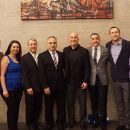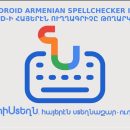(PR Newswire)- The Shoah Foundation of the University of Southern California of the USA has received one of the largest collections of testimonies from survivors of the Armenian Genocide that were recorded over decades by USbased Armenia historian Dr. Richard Hovannisian, reports.
The Richard G. Hovannisian Armenian Genocide Oral History Collection will officially be announced as a part of the Visual History Archive at a ceremony today.
It will also be the Archive’s first audio-only collection. Initially, a pilot of 10 testimonies – seven in English and three in Armenian – will be available to the public on March 9 in the Institute’s Visual History Archive. The rest will be added as they are digitized and indexed to the high standards used by the Institute.
In addition to the audiotapes recorded in a variety of formats, the new collection includes documents and photographs corresponding to each interview, transcripts and translations that Hovannisian and his students put together over the years.
The vast majority of the collection was recorded in Armenian, but up to 20 percent of the testimonies are in English; there is a smaller portion of Turkish and Spanish language interviews.
The son of a genocide survivor, Hovannisian believes deeply in the power of testimony as a tool to educate, combat denial, and communicate the magnitude of a criminal scheme that claimed an estimated 1.5 million Armenian lives.
“The figure ‘a million and a half’ can roll right over our shoulders,” he said. “But it’s different when you take those individual interviews and start listening to them one by one. And then it becomes a million-and-a-half individuals and the loss of a civilization, of a way of life, a space where people lived for more than 3,000 years, and everything that space contained.
” The Institute also houses the Armenian Film Foundation’s collection of Armenian Survivor testimony, which was fully integrated into the Visual History Archive in late 2016.
“By adding more context to the Visual History Archive, we continue to honor the memories of those whose lives were needlessly taken,” said USC Shoah Foundation Vinci-Viterbi Executive Director Stephen Smith. “These voices will help ensure future generations will learn from those who experienced the horrors of the Armenian Genocide.”





